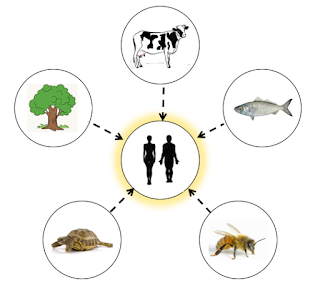Beyond left and right: Laterality and verticality in the political imagination
By Rodrigo Cáceres
We are
animals of conventions and we know this because it is relatively intuitive for
us. We know for example that the colors of the traffic lights mean what they
mean not because there is an inherent relationship between red and stopping or between
green and moving forward. Their meaning is given simply because at some point a
group of people agreed that it would be so, that these three colors would be
chosen and that each would mean each thing. It is nothing more than a
convention, an agreement or pact between people.
We actually
live in a world of conventions: letters are conventions, words are conventions,
nations are conventions, states are conventions, political-administrative
boundaries are conventions, laws are conventions, the police is a convention,
parliamentary systems are conventions, and a very long etcetera.
In the
political domain, one of the things we have done by convention for more
than two centuries is to think and talk about political ideologies in terms of
laterality or horizontality: we talk about the left, center and right. This
scheme was born in 1789 in the context of the French revolution and has
subsequently spread to the rest of the world, remaining basically unchanged up to our current time.
In this
schema we think and place people and political parties as if they were points
on an imaginary horizontal line, which allows us to talk about things like the
"extreme right" and the "extreme left." This makes sense
since the lines have extremes on each side. Horizontal lines are schemas that we
can use to think about the symmetric wings of a bird, which is why it makes sense to speak of “right-wing” ideas or “left-wing” ideas. In a general sense, in our worlds we are caught up in a way of
thinking in which political ideologies are spoken and imagined in terms of
horizontality.
Our
personal problem from being raised in a culture that lives through this
convention is the problem of preferences: Which is better, left or right?
Unfortunately, as it is a convention - like the traffic light - the terms
"left" and "right" have no inherent relation to what they mean in (political)
practice, so a priori it is not obvious to know what are the "right-wing
ideas" and the "left-wing ideas". Who do they favor? What are their
beliefs and preferences?
What we can
do to know which to prefer from the two is to use other aspects of our lives as
guides. On the one hand, we have familiar sayings that tell us things like
"all extremes are bad" and that we have to "maintain balance or
equilibrium" or reach a "just middle".
On the other
hand, when we talk about morality, we talk about a “righteous” person to refer
to someone that is correct, honest, honorable, etc. In English-speaking
countries, "right" means good, correct, true, true, fair and adequate, all being words that represent things that we generally prefer:
being fair, good, correct, etc.
In
addition, approximately 90% of the world's population is right-handed, and in
general the right hand is the "good hand" in many languages and
cultures. Traditionally the left hand has been called "sinister",
"the hand of the devil", and left-handed people have been forced to
repress their left-handedness.
Daniel
Casasanto, a psychologist at the University of Chicago, studies how the western
world is mentally biased to the right. He has shown that our handedness or
manual prevalence unconsciously influences many of our preferences and
decisions: the people we vote for, the things we buy, etc. According to
Casasanto, this would be a bodily-based natural influence since it occurs from a very early age. In one of his scientific articles, he explains that "from an
early age, right-handers associate rightward space more strongly with
positive ideas and leftward space with negative ideas, but the opposite is
true for left-handers." The fact that we live in a culture where the right
is usually good, would simply be a consequence of the fact that right-handers are a
majority: the cultural manifestation of a majority force which manifests itself through how their right-handedness influences their
way of thinking.
Summarizing
this cultural bias to the right, he explains that "if people conceptualize
good and bad things in a left-right continuum in the manner dictated by their
culture and language, then everyone should think that right is good."
Moreover -
and returning to the political topics - psychologist Stewart McCann showed that
in the United States (where the left/right duality equals the Democrats/Republicans duality), States with a higher percentage of right-handed people tend to be more
Republican and that States with a higher percentage of left-handed people tend
to be more Democrats.
In this
way, we understand that this type of unconscious influence of a majority of right-handed people suggests that
it is good to hold "right-wing" political ideas, regardless of what these ideas are. This bias towards the right is more
profound in English-speaking countries since for example in Spanish "right"
(derecho) does not mean things like
"true", "good", “correct”, “adequate” or "true".
What would
happen if the left-right scheme was actually inadequate to think about our
current situation?
It is
necessary first that we notice that this horizontal scheme is reproduced and
constantly recreated in our culture through language. It is a conventional
reality, that is, it is something that is real only because we speak in these
terms on a daily basis. What usually happens with conventions is that people
are totally unaware that they are using a convention or agreement. But since they are nothing more than conventions, they can be questioned and changed if they are found not to be adequate.
In other
words, people who live in conventions such as the left-right scheme, live in
the implicit acceptance of this scheme as something valid or real, simply
because if they did not accept it they would not use it for talking. The main point is that we do not perceive conventions as conventions, we perceive them as effective instruments
that allow us to refer to certain issues. In this case, the effectiveness of
the left-right linear scheme is that it allows us to talk about the topic of
politics thanks to its very simple linear structure that has extremes, a center and points
on the line.
Why would
the left-right scheme not be adequate?
We saw on
the one hand that our innate handedness biases our culture to the right, since right-handed
people are the vast majority. On the other hand, what is most evident to
consider is that we live in hierarchical societies, and that hierarchies are
schemes that we understand in terms of verticality: as a vertical line in which
there are people or groups above, those who have the power and the authority,
and then those below, who are usually the exploited, manipulated and abused by
those who are above.
From this perspective it seems at least strange (to more than one it might seem idiotic) that we understand politics - and therefore, the organization of society - in horizontal terms when we actually live in a vertically structured society.
Actually,
thinking about politics in terms of verticality is much more intuitive: "Up-level
ideas" are naturally ideas that favor powerful groups in society, while
"Down-level ideas" are ideas that favor those who they are not
powerful and those who are unable to politically represent themselves: children, the poor, the
elder, those who are sick, marginalized, excluded, etc. The inability to represent one's interests and the consequent lack of consideration is probably deepest when it comes to the exploitation of
rivers, oceans, forests, land and the animals and plants that live there, whose
well-being is systematically ignored in our societies.
In this sense, thinking in terms of verticality indirectly makes us note that in the current
left-right scheme, both the left and the right explicitly or implicitly accept
extractivism, industrialism and speciesism, by systematically refusing to
consider the welfare of nature through treating it as something that must be
permanently exploited. And these are the beliefs that are provoking the current planetary
ecological crisis.
We can also
note that the implicit preferences of those who prefer Up or Down become more
transparent. On the one hand, we would know that those who hold Up-level ideas prefer
that there are certain groups that hold the power and decide on the organization of
society, in addition to preferring that political decisions favor these groups.
On the
other hand, it is intuitive that those who have Down-level ideas prefer that
the organization of society be decided by the people, in addition to preferring
that political decisions favor precisely the disadvantaged: the sick, the poor, the children, the crazy, those who suffer from abuse and violence, the marginalized and the
excluded.
Thinking
about politics in terms of verticality is more intuitive, more adequate and
smarter than thinking in terms of laterality, especially in our current
situation where those who are up in the hierarchy and those who have Up-level
ideas do not want to lose their privileged positions, they want to maintain and
perpetuate their positions of power. In order to do so, they fiercely refuse to change
the logics of the organization of society, since precisely those logics are the ones that generate a continuous increase in their power, their fortunes, their possession
over the media and their influence and power over political decisions and the laws that govern us.
The important thing to understand here is that it is necessary that we see the
left-right scheme for what it really is, nothing more and nothing less than a
convention, a historical convention which has shaped the reality of how
politics are thought about throughout nations. And conventions, as we know,
are not universal laws or norms, they can and should be changed if we realize
that they are inadequate. The Up-Down scheme seems the most evident and
intuitive as an alternative.
Rotating vertically our horizontal political scheme of thought means obviously a profound change in the way we think about politics and the things we do in it.
Rotating vertically our horizontal political scheme of thought means obviously a profound change in the way we think about politics and the things we do in it.
________________________________________________________________________
Consider supporting us so we keep bringing you more high quality and deeply insightful content.
Consider supporting us so we keep bringing you more high quality and deeply insightful content.





Comments
Post a Comment